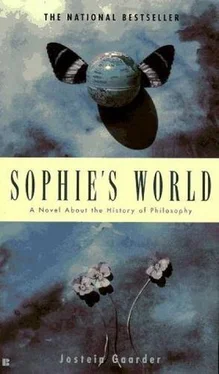Jostein Gaarder - Sophie's World - A Novel About the History of Philosophy
Здесь есть возможность читать онлайн «Jostein Gaarder - Sophie's World - A Novel About the History of Philosophy» весь текст электронной книги совершенно бесплатно (целиком полную версию без сокращений). В некоторых случаях можно слушать аудио, скачать через торрент в формате fb2 и присутствует краткое содержание. ISBN: , Издательство: BERKLEY BOOKS, NEW YORK, Жанр: Философия, на английском языке. Описание произведения, (предисловие) а так же отзывы посетителей доступны на портале библиотеки ЛибКат.
- Название:Sophie's World: A Novel About the History of Philosophy
- Автор:
- Издательство:BERKLEY BOOKS, NEW YORK
- Жанр:
- Год:неизвестен
- ISBN:0-425-15225-1
- Рейтинг книги:4 / 5. Голосов: 1
-
Избранное:Добавить в избранное
- Отзывы:
-
Ваша оценка:
- 80
- 1
- 2
- 3
- 4
- 5
Sophie's World: A Novel About the History of Philosophy: краткое содержание, описание и аннотация
Предлагаем к чтению аннотацию, описание, краткое содержание или предисловие (зависит от того, что написал сам автор книги «Sophie's World: A Novel About the History of Philosophy»). Если вы не нашли необходимую информацию о книге — напишите в комментариях, мы постараемся отыскать её.
Sophie's World: A Novel About the History of Philosophy — читать онлайн бесплатно полную книгу (весь текст) целиком
Ниже представлен текст книги, разбитый по страницам. Система сохранения места последней прочитанной страницы, позволяет с удобством читать онлайн бесплатно книгу «Sophie's World: A Novel About the History of Philosophy», без необходимости каждый раз заново искать на чём Вы остановились. Поставьте закладку, и сможете в любой момент перейти на страницу, на которой закончили чтение.
Интервал:
Закладка:
“Thank you.”
“I think you will find that much of what marches under the New Age banner is humbug. Even the so-called New Religion, New Occultism, and modern superstitions of all kinds have influenced the western world in recent decades. It has become an industry. Alternative offers on the philosophical market have mushroomed in the wake of the dwindling support for Christianity.”
“What sort of offers?”
“The list is so long I wouldn’t dare to begin. And anyway it’s not easy to describe one’s own age. But why don’t we take a stroll through town? There’s something I’d like you to see.”
“I haven’t got much time. I hope you haven’t forgotten the garden party tomorrow?”
“Of course not. That’s when something wonderful is going to happen. We just have to round off Hilde’s philosophy course first. The major hasn’t thought beyond that, you see. So he loses some of his mastery over us.”
Once again he lifted the Coke bottle, which was now empty, and banged it down on the table.
They walked out into the street where people were hurrying by like energetic moles in a molehill. Sophie wondered what Alberto wanted to show her.
They walked past a big store that sold everything in communication technology, from televisions, VCRs, and satellite dishes to mobile phones, computers, and fax machines.
Alberto pointed to the window display and said:
“There you have the twentieth century, Sophie. In the Renaissance the world began to explode, so to speak. Beginning with the great voyages of discovery, Europeans started to travel all over the world. Today it’s the opposite. We could call it an explosion in reverse.”
“In what sense?”
“In the sense that the world is becoming drawn together into one great communications network. Not so long ago philosophers had to travel for days by horse and carriage in order to investigate the world around them and meet other philosophers. Today we can sit anywhere at all on this planet and access the whole of human experience on a computer screen.”
“It’s a fantastic thought. And a little scary.”
“The question is whether history is coming to an end— or whether on the contrary we are on the threshold of a completely new age. We are no longer simply citizens of a city—or of a particular country. We live in a planetary civilization.”
“That’s true.”
“Technological developments, especially in the field of communications, have possibly been more dramatic in the last thirty to forty years than in the whole of history put together. And still we have probably only witnessed the beginning . . .”
“Was this what you wanted me to see?”
“No, it’s on the other side of the church over there.”
As they were turning to leave, a picture of some UN soldiers flashed onto a TV screen.
“Look!” said Sophie.
The camera zoomed in on one of the UN soldiers. He had a black beard almost identical to Alberto’s. Suddenly he held up a piece of card on which was written: “Back soon, Hilde!” He waved and was gone.
“Charlatan!” exclaimed Alberto.
“Was that the major?”
“I’m not even going to answer that.”
They walked across the park in front of the church and came out onto another main street. Alberto seemed slightly irritable. They stopped in front of LIBRIS, the biggest bookstore in town.
“Let’s go in,” said Alberto.
Inside the -store he pointed to the longest wall. It had three sections: NEW AGE, ALTERNATIVE LIFESTYLES, and MYSTICISM.
The books had intriguing titles such as Life after Death?, The Secrets of Spiritism, Tarot, The UFO Phenomenon, Healing, The Return of the Gods, You Have Been Here Before, and What Is Astrology? There were hundreds of books. Under the shelves even more books were stacked up.
“This is also the twentieth century, Sophie. This is the temple of our age.”
“You don’t believe in any of this stuff?”
“Much of it is humbug. But it sells as well as pornography. A lot of it is a kind of pornography. Young people can come here and purchase the ideas that fascinate them most. But the difference between real philosophy and these books is more or less the same as the difference between real love and pornography.”
“Aren’t you being rather crass?”
“Let’s go and sit in the park.”
They marched out of the store and found a vacant bench in front of the church. Pigeons were strutting around under the trees, the odd overeager sparrow hopping about amongst them.
“It’s called ESP or parapsychology,” said Alberto. “Or it’s called telepathy, clairvoyance, and psychokinetics. It’s called spiritism, astrology, and urology.”
“But quite honestly, do you really think it’s all hum-bug?”
“Obviously it would not be very appropriate for a real philosopher to say they are all equally bad. But I don’t mind saying that all these subjects together possibly chart a fairly detailed map of a landscape that does not exist. And there are many ‘figments of the imagination’ here that Hume would have committed to the flames. Many of those books do not contain so much as one iota of genuine experience.”
“Why are there such incredible numbers of books on such subjects?”
“Publishing such books is a big commercial enterprise. It’s what most people want.”
“Why, do you think?”
“They obviously desire something mystical, something different to break the dreary monotony of everyday life. But it is like carrying coals to Newcastle.”
“How do you mean?”
“Here we are, wandering around in a wonderful adventure. A work of creation is emerging in front of our very eyes. In broad daylight, Sophie! Isn’t it marvelous!”
“I guess so.”
“Why should we enter the fortune-teller’s tent or the backyards of academe in search of something exciting or transcendental?”
“Are you saying that the people who write these books are just phonies and liars?”
“No, that’s not what I’m saying. But here, too, we are talking about a Darwinian system.”
“You’ll have to explain that.”
“Think of all the different things that can happen in a single day. You can even take a day in your own life. Think of all the things you see and experience.”
“Yes?”
“Now and then you experience a strange coincidence. You might go into a store and buy something for 28 crowns. Later on that day Joanna comes along and gives you the 28 crowns she owes you. You both decide to go to the movies—and you get seat number 28.”
“Yes, that would be a mysterious coincidence.”
“It would be a coincidence, anyway. The point is, people collect coincidences like these. They collect strange— or inexplicable—experiences When such experiences— taken from the lives of billions of people—are assembled into books, it begins to look like genuine data. And the amount of it increases all the time. But once again we are looking at a lottery in which only the winning numbers are visible.”
“But there are clairvoyants and mediums, aren’t there, who are constantly experiencing things like that?”
“Indeed there are, and if we exclude the phonies, we find another explanation for these so-called mysterious experiences.”
“And that is?”
“You remember we talked about Freud’s theory of the unconscious . . .”
“Of course.”
“Freud showed that we can often serve as ‘mediums’ for our own unconscious. We might suddenly find ourselves thinking or doing something without really knowing why. The reason is that we have a whole lot of experiences, thoughts, and memories inside us that we are not aware of.”
“So?”
“People sometimes talk or walk in their sleep. We could call this a sort of ‘mental automatism.’ Also under hypnosis, people can say and do things ‘not of their own volition.’ And remember the surrealists trying to produce so-called automatic writing. They were just trying to serve as mediums for their own unconscious.”
Читать дальшеИнтервал:
Закладка:
Похожие книги на «Sophie's World: A Novel About the History of Philosophy»
Представляем Вашему вниманию похожие книги на «Sophie's World: A Novel About the History of Philosophy» списком для выбора. Мы отобрали схожую по названию и смыслу литературу в надежде предоставить читателям больше вариантов отыскать новые, интересные, ещё непрочитанные произведения.
Обсуждение, отзывы о книге «Sophie's World: A Novel About the History of Philosophy» и просто собственные мнения читателей. Оставьте ваши комментарии, напишите, что Вы думаете о произведении, его смысле или главных героях. Укажите что конкретно понравилось, а что нет, и почему Вы так считаете.












